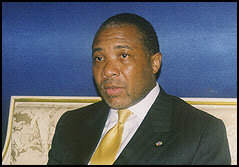 POLITICAL BACKGROUND POLITICAL BACKGROUND |
 GOVERNMENT GOVERNMENT |
The form of government is Republican, with three separate and coordinate branches: the Legislature, comprising a 26-seat Senate and a 64-seat House of Representatives; the Executive, with executive power vested in the President and Vice President; and the Judiciary, made up of a Chief Justice and four Associate Justices. Consistent with the principles of separation of powers and checks and balances, the three branches maintain independence from interference by any other branch. Liberia is a unitary state divided into counties (regions) for administrative purposes.

The Constitution is the supreme and fundamental law of Liberia and its provisions shall be binding on all authorities and persons throughout the Republic. The Constitution first came into being in 1847, but was abrogated in 1980 after a military coup. The present Constitution, the second, became effective January 1986 after approval by the people through a referendum.
The country is led by President Charles Taylor, who swept the polls in a 1997 election that officially ended seven-years of civil war in 1989. He is the 21st President of Liberia.
 POLITICAL HISTORY POLITICAL HISTORY |
The land mass today known as Liberia, no doubt, existed inhabited before the arrival on these shores of freed Negro slaves from North America in the early 1800s.
Some 25 years after the former slaves arrived, they declared the land a republic and named it Liberia, drawn from the Latin word "liber", meaning free. The declaration of independence on July 26, 1847 made Liberia one of few African countries never to have experienced colonization.
However, for more than 130 years the descendants of the freed slaves clinched to power, excluding the indigenous people they met on arrival from the political, economic and social developments of the nation-state. There had been battles between the tribesmen and the settlers over land ownership prior to the declaration of independence, with the indigenous stock agreeing to a policy of accommodation for their returning brothers.
The century-old settler oligarchy was forced to an end when some 20 "native" non-commissioned soldiers of the Liberian army staged the country's first military coup d'état that brought a Master Sergeant, Samuel K. Doe, to power. The coup was hailed as a victory for the indigenous stock since Doe was the first native to ascend to the highest office in the land and had curtailed the 130 years of power monopoly by the settler group. | President William R. Tolbert, a settler descendent, was killed in the take-over. One of the first actions of the military junta was the execution of 13 former government officials of the settler origin referred to as American-Liberian, because their forefathers came from America.
Junta leader Doe's brutal and dictatorial rule, coupled with the glaring rigging of the national elections of October 1985 that kept him in power, as a civilian President did not endear him to the people.
His subsequent clamp down on the opposition, his purge of a certain ethnic group and the widespread abuse of power provided the perfect alibi for a devastating civil crisis. On Christmas Eve 1989, a relatively small band of armed insurgents led by Charles Taylor, then a fugitive from justice on charges of embezzlement, invaded the country from neighboring Ivory Coast.
Mr. Taylor, an American-Liberian with maternal indigenous ties, justified his war by the poor governance style of Doe and capitalized on the feud between Doe's Krahn tribe and the purged Gio and Mano tribes of northern Liberia from where the insurgents entered.
The ensuing seven-year war saw the creation of nearly half a dozen warring factions drawn mainly on tribal and economic lines rather than on ideological divides.
The nation degenerated into anarchy, and so the Economic Community of West African States (ECOWAS) in 1990 deployed an intervention force to install a ceasefire, and an interim government to oversee the return to democratic, civilian rule. This did not come until after some 15 peace-talks and another three transitional governments.
Presidential and Legislative elections held under a Proportional Representation (PR) system in July 1997 saw Mr. Taylor sweep the polls and obtain an automatic majority in the Legislature (parliament).
Three years after elections, President Taylor's major task has been the restoration of political stability and national security for the reconstruction, growth and development of the country ravaged by a long lasting war.
Healing the war-years wounds through an all-encompassing and effective national reconciliation and reintegration program has proved achievable, but slow and difficult.
Of the 750,000 Liberians who fled into exile due to the civil conflict, at least a quarter of a million still reside as refugees in the West African sub-region and other parts of the world.
There are currently some 12 political parties in the country that participated in the 1997 elections, howbeit obvious that a sizable number of them may be nearing dormancy.
The country's next Presidential and Legislative elections come up in the year 2003. |

